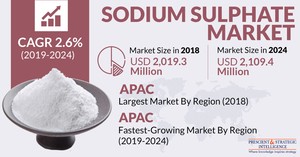How is Increasing Demand for Powdered Detergents Fuelling Growth of Global Sodium Sulphate Market?
Posté par Aryan Kumar
Corps
The rising requirement of powdered detergents in the developing nations of Africa, Latin America, and Asia-Pacific such as Chile, India, Brazil, China, Colombia, Indonesia, Philippines, Thailand, and Vietnam is one of the major factors fuelling the increasing production of sodium sulphate across the world. In addition to this, the macroeconomic growth in many countries and rising preference for machine-based washing of clothes over the conventionally used hand-based washing of clothes are further boosting the demand for sodium sulphate all over the world.
The soaring number of construction projects and infrastructural developmen-tal activities in both developed and developing nations is another major factor contributing toward the increasing production of sodium sulphate. Glass is ex-tensively used in the modern buildings, especially in the exteriors and artificial facades and is thus, highly sought after in construction industry. Therefore, with the rising number of construction projects, the demand for glass will in-crease, which will in turn, boost the production of sodium sulphate, as this material is widely used as a fining agent in glass manufacturing for removing the small air bubbles from the molten glass.
Due to the above-mentioned factors, the value of the global sodium sul-phate market is predicted to increase from $2,019.3 million to $2,109.4 mil-lion from 2018 to 2024. The market is predicted to exhibit a CAGR of 2.6% during the forecast period (2019—2024). Sodium sulphate is basically used as a filler in powdered detergents for modifying their characteristics and physical properties. In simpler terms, the addition of sodium sulphate in the detergents makes them fluidic by preventing the particles of the powder from sticking together and forming a huge block.
Sodium sulphate is used in a plethora of applications such as those pertaining to the production of pulp and paper, textiles, soaps and detergents, and glass. Out of these, the utilization of sodium sulphate was found to be the highest in the production of soaps and detergents in 2018. This is mainly ascribed to the fact that sodium sulphate is used extensively in these materials as a desiccant and fining agent. Additionally, the utilisation of sodium sulphate in detergents reduces their cost of production and makes them dissolve easily in warm wa-ter, as it is a hydrogen (pH)-neutral material.
Geographically, the sodium sulphate market is expected to boom in the Asia-Pacific (APAC) region during the forecast period. This is primarily as-cribed to the increasing usage of the substance in a wide array of applica-tions, majorly those related to the production of textiles and soaps and deter-gents, in China. Additionally, sodium sulphate is widely used in the Chinese personal care sector for the production of soap bars, shampoo, body washes, and other hygiene and personal care products.
Thus, it can be said with full surety that the demand for sodium sulphate will skyrocket throughout the world during the next few years, mainly because of the increasing requirement of powdered detergents and the rising popularity of machine-based washing of clothes.
The soaring number of construction projects and infrastructural developmen-tal activities in both developed and developing nations is another major factor contributing toward the increasing production of sodium sulphate. Glass is ex-tensively used in the modern buildings, especially in the exteriors and artificial facades and is thus, highly sought after in construction industry. Therefore, with the rising number of construction projects, the demand for glass will in-crease, which will in turn, boost the production of sodium sulphate, as this material is widely used as a fining agent in glass manufacturing for removing the small air bubbles from the molten glass.
Due to the above-mentioned factors, the value of the global sodium sul-phate market is predicted to increase from $2,019.3 million to $2,109.4 mil-lion from 2018 to 2024. The market is predicted to exhibit a CAGR of 2.6% during the forecast period (2019—2024). Sodium sulphate is basically used as a filler in powdered detergents for modifying their characteristics and physical properties. In simpler terms, the addition of sodium sulphate in the detergents makes them fluidic by preventing the particles of the powder from sticking together and forming a huge block.
Sodium sulphate is used in a plethora of applications such as those pertaining to the production of pulp and paper, textiles, soaps and detergents, and glass. Out of these, the utilization of sodium sulphate was found to be the highest in the production of soaps and detergents in 2018. This is mainly ascribed to the fact that sodium sulphate is used extensively in these materials as a desiccant and fining agent. Additionally, the utilisation of sodium sulphate in detergents reduces their cost of production and makes them dissolve easily in warm wa-ter, as it is a hydrogen (pH)-neutral material.
Geographically, the sodium sulphate market is expected to boom in the Asia-Pacific (APAC) region during the forecast period. This is primarily as-cribed to the increasing usage of the substance in a wide array of applica-tions, majorly those related to the production of textiles and soaps and deter-gents, in China. Additionally, sodium sulphate is widely used in the Chinese personal care sector for the production of soap bars, shampoo, body washes, and other hygiene and personal care products.
Thus, it can be said with full surety that the demand for sodium sulphate will skyrocket throughout the world during the next few years, mainly because of the increasing requirement of powdered detergents and the rising popularity of machine-based washing of clothes.









commentaires